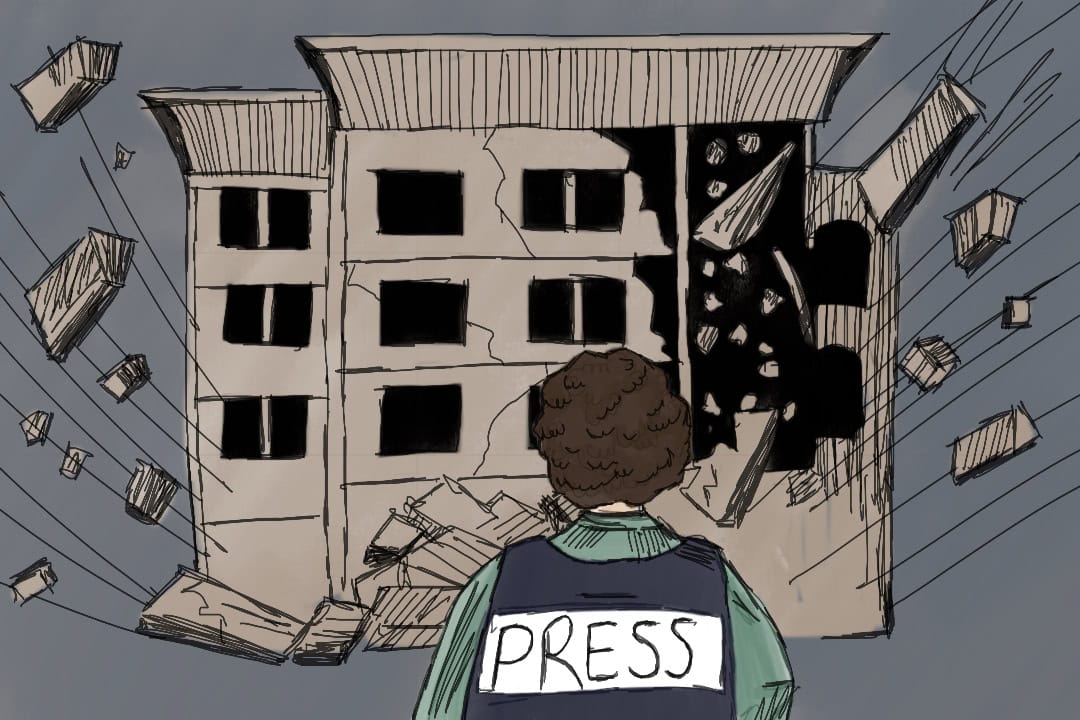Content Warning: This article describes death and the ongoing violence in Gaza.
In journalism, phrases like “non-partisan” and “objectivity” are not only guiding principles but also cornerstones of quality coverage. In theory, journalistic neutrality is an excellent idea for regulating news sources. However, I don’t believe true neutrality exists.
I think the Toronto Star distinguishes between news and opinion writing. The paper states that, “To be impartial does not require a news organization to be unquestioning or to refrain from editorial expression,” but that “all content that contains explicit opinion or personal interpretation should be clearly identified as opinion or analysis, as appropriate.”
Our understanding of neutrality is often limited to this news and opinion distinction. However, in reality, I argue that neutrality or the lack thereof often manifests in ways beyond this surface-level divide. Characterizing neutrality as the opposite of opinion or bias overlooks how the process of exercising neutrality happens long before a story is put on paper. Today, this is most evident in the case of Israel’s genocide of Gaza.
The myth of objectivity
Neutrality first comes into question in the newsroom, where journalists decide which stories to cover and which to ignore. Omitting these nuances in blanket definitions of neutrality is exactly what permits the dehumanization of Muslim and Arab communities and diminishes outrage over issues like genocide.
I find the lack of neutrality in today’s journalism deeply abhorrent. Coverage has shown a stark disparity between Palestinian and Israeli fatalities. The death toll in Gaza has reached nearly 43,000, including almost 17,000 children — yet, headlines overwhelmingly focus on the comparatively fewer losses on the Israeli side.
A USA Today article from September reported the death of six Israeli hostages, claiming that they were murdered by Hamas, as stated by the Israeli military while omitting the conflicting accounts from Hamas officials that the hostages may have been killed in an Israeli airstrike. Additionally, mainstream media often excludes the fact that approximately 3,000 Palestinians from Gaza are reportedly being held hostage by Israel since 2023.
For individuals to be humanized or dehumanized, they must first exist within the sphere of public discourse. Where Israeli civilians are afforded the opportunity to have their stories told, Palestinians have to resort to sharing images of unimaginable loss — holding the mangled bodies of their children before phone cameras — in the hopes that someone, somewhere on the internet, will see their suffering and plea that this cannot go on.
The curse of disproportionate representation
When reporting on BIPOC and non-Western communities, I find that journalistic standards of neutrality often fall short. The standards fail to hold journalists and news outlets accountable for proportionate representation and do not emphasize the imperativeness of context and perspective. As a result, when events are concealed or distorted, readers are more likely to develop moral apathy toward human suffering.
In late September, Israel attacked Lebanon through exploding pagers and launched a ground invasion of residential areas under the premise of targeting Hezbollah — an Iran-backed military group formed in 1982 to resist Israel’s occupation of southern Lebanon. On October 8, 2023, Hezbollah started launching airstrikes at Israel in response to Israel’s violent attacks on Gaza.
News outlets award Israel with significantly more leeway when it comes to the narrative of self-defence. From what I see, even Israel’s most barbaric acts during this genocide are justified under this self-defence rhetoric by political leaders and news outlets alike. Other parties like Palestine or Lebanon are allowed no such luxury — even after more than a year of violent attacks, which has resulted in over 3,000 people killed in Lebanon since last October, and genocidal actions in Palestine.
Journalists are already taking sides, whether we acknowledge it or not. As journalists, our immediate responsibility now is to seek alternative avenues for expression — such as amplifying Palestinian voices who are independently reporting via social media platforms. Our primary goal should be to humanize the dehumanized.
Journalism has arguably been flawed since its inception, with biases continually contaminating what we call ‘neutrality.’ The implications of this, especially today, are grave. We have become desensitized to the suffering of Palestinians — and, by extension, Arabs and Muslims — who are now faced with the task of proving their humanity and their right to live.
It may be a while before journalistic standards are amended to remedy this. But in the meantime, as ordinary citizens, I believe we can play our part in flooding the inboxes of mainstream news outlets to demand fairer coverage. If we can’t be heard through sympathy, we must be heard through the next best thing: a nuisance.
Ayesha Siddiqui is a third-year student studying history and English. She is an associate editor for the Trinity Times and The Woodsworth Review, Director of Humans of the Ummah, journal editor-in-chief for the History Students Association, and a columnist for the What’s New in News section of The Varsity’s Opinion column.



No comments to display.